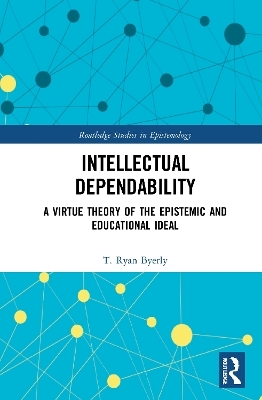
Intellectual Dependability
A Virtue Theory of the Epistemic and Educational Ideal
Seiten
2023
Routledge (Verlag)
978-0-367-75563-8 (ISBN)
Routledge (Verlag)
978-0-367-75563-8 (ISBN)
This is the first book devoted to the question of what it is to be an intellectually dependable person. By directing attention to the ideal of intellectual dependability, the book marks a novel turn of scholarly interest toward a neglected dimension of the ideal inquirer that will inform epistemological theorizing and educational practice.
Intellectual Dependability is the first research monograph devoted to addressing the question of what it is to be an intellectually dependable person—the sort of person on whom one’s fellow inquirers can depend in their pursuit of epistemic goods. While neglected in recent scholarship, this question is an important one for both epistemology—how we should conceptualize the ideal inquirer—and education—how we can enable developing learners to grow toward this ideal.
The book defends a virtue theory according to which being an intellectually dependable person is distinctively a matter of possessing a suite of neglected virtues called "the virtues of intellectual dependability" that are themselves distinctively concerned with promoting epistemic goods in others’ inquiries. After defending the existence and educational significance of these virtues as a group, the book turns toward the project of identifying and conceptualizing several specific instances of these virtues in detail. Virtues discussed include intellectual benevolence, intellectual transparency, communicative clarity, audience sensitivity, and epistemic guidance. In each case, an interdisciplinary treatment of the nature of the virtue and its relationship to other virtues, vices, and personality features is offered, drawing especially on relevant research in Philosophy and Psychology. The book concludes with a chapter devoted to identifying distinctive ways these virtues of intellectual dependability are manifested when it is inquiring communities, rather than individuals, that occupy the position of intellectual dependence.
By directing attention to the ideal of intellectual dependability, the book marks a novel turn of scholarly interest explicitly toward a neglected dimension of the ideal inquirer that will inform both epistemological theorizing and educational practice.
Intellectual Dependability is the first research monograph devoted to addressing the question of what it is to be an intellectually dependable person—the sort of person on whom one’s fellow inquirers can depend in their pursuit of epistemic goods. While neglected in recent scholarship, this question is an important one for both epistemology—how we should conceptualize the ideal inquirer—and education—how we can enable developing learners to grow toward this ideal.
The book defends a virtue theory according to which being an intellectually dependable person is distinctively a matter of possessing a suite of neglected virtues called "the virtues of intellectual dependability" that are themselves distinctively concerned with promoting epistemic goods in others’ inquiries. After defending the existence and educational significance of these virtues as a group, the book turns toward the project of identifying and conceptualizing several specific instances of these virtues in detail. Virtues discussed include intellectual benevolence, intellectual transparency, communicative clarity, audience sensitivity, and epistemic guidance. In each case, an interdisciplinary treatment of the nature of the virtue and its relationship to other virtues, vices, and personality features is offered, drawing especially on relevant research in Philosophy and Psychology. The book concludes with a chapter devoted to identifying distinctive ways these virtues of intellectual dependability are manifested when it is inquiring communities, rather than individuals, that occupy the position of intellectual dependence.
By directing attention to the ideal of intellectual dependability, the book marks a novel turn of scholarly interest explicitly toward a neglected dimension of the ideal inquirer that will inform both epistemological theorizing and educational practice.
T. Ryan Byerly is Senior Lecturer in the Philosophy Department at the University of Sheffield. He is author or editor of several books, including Putting Others First: The Christian Ideal of Others-Centeredness (Routledge, 2019).
Introduction 1
PART I
1 The Intellectually Dependable Person 9
2 The Virtues of Intellectual Dependability 34
3 Educating for Intellectual Dependability 56
PART II
4 Intellectual Benevolence 83
5 Intellectual Transparency 105
6 Communicative Clarity 125
7 Audience Sensitivity 143
8 Epistemic Guidance 163
9 Being Intellectually Dependable for Groups 179
| Erscheinungsdatum | 28.09.2023 |
|---|---|
| Reihe/Serie | Routledge Studies in Epistemology |
| Verlagsort | London |
| Sprache | englisch |
| Maße | 152 x 229 mm |
| Gewicht | 453 g |
| Themenwelt | Geisteswissenschaften ► Philosophie ► Erkenntnistheorie / Wissenschaftstheorie |
| Geisteswissenschaften ► Psychologie ► Allgemeine Psychologie | |
| Geisteswissenschaften ► Religion / Theologie | |
| Sozialwissenschaften ► Pädagogik ► Allgemeines / Lexika | |
| Sozialwissenschaften ► Pädagogik ► Bildungstheorie | |
| ISBN-10 | 0-367-75563-7 / 0367755637 |
| ISBN-13 | 978-0-367-75563-8 / 9780367755638 |
| Zustand | Neuware |
| Informationen gemäß Produktsicherheitsverordnung (GPSR) | |
| Haben Sie eine Frage zum Produkt? |
Mehr entdecken
aus dem Bereich
aus dem Bereich
die Grundlegung der modernen Philosophie
Buch | Softcover (2023)
C.H.Beck (Verlag)
18,00 €
Buch | Softcover (2023)
Reclam, Philipp (Verlag)
7,00 €

![Was heißt Denken?. Vorlesung Wintersemester 1951/52. [Was bedeutet das alles?] - Martin Heidegger](/media/113619842)
